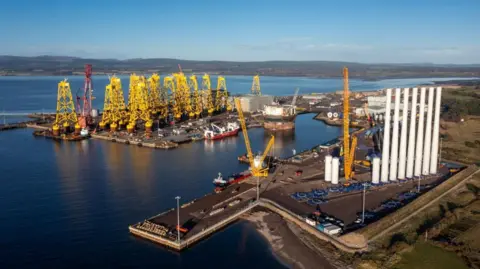Special customs area set up at Highland port
 Port of Nigg
Port of NiggThe UK government has given a Highland port permission to have some of its own customs arrangements.
Nigg, which is owned by engineering company Global Energy Group, is the first site in the new Inverness and Cromarty Firth Green Freeport (ICFGF) to get the designation.
ICFGF said it would simplify paperwork and reduce costs - including taxes - around large engineering equipment and components imported from overseas.
It said the move could attract more companies and investment to the freeport, which was set up following an announcement two years ago.
The status has been awarded by the UK government department HM Revenue and Customs (HMRC).
Port of Nigg's customs site is a designated area within the freeport where usual UK customs rules, such on taxes and other duties to be paid, do not apply.
ICFGF said permission was granted by HMRC after it carried out a stringent audit and verification process.
The status will be regularly reviewed and covers products such as high voltage electricity cables, wind turbine generator components and fabricated steel structures.
ICFGF said the prospect of securing the designation was key to attracting Sumitomo Electric Ltd to Nigg.
The Japanese company is constructing a £350m subsea cable manufacturing plant at the port, which is expected to create more than 150 jobs.
ICFGF chief executive Calum MacPherson said more custom sites could follow.
He added: "Our ports do not handle small consumer goods so we will not see, for example, transit of large volumes of food and drink.
"Where our ports excel is in the handling of heavy engineering components for the energy sector, and this status significantly raises our potential as a major European hub for offshore wind and renewable energy technologies."
Green freeports are able to offer tax incentives and lower tariffs within the zones they cover.
They also include commitments to meeting net zero targets and supporting fair work practices.
